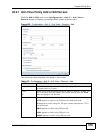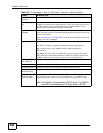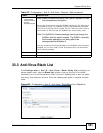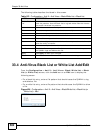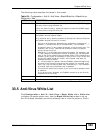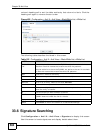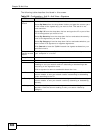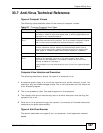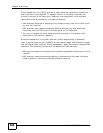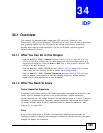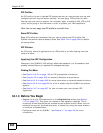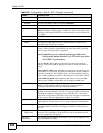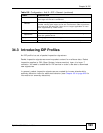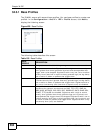
Chapter 33 Anti-Virus
ZyWALL USG 300 User’s Guide
587
33.7 Anti-Virus Technical Reference
Types of Computer Viruses
The following table describes some of the common computer viruses.
Computer Virus Infection and Prevention
The following describes a simple life cycle of a computer virus.
1 A computer gets a copy of a virus from a source such as the Internet, e-mail, file
sharing or any removable storage media. The virus is harmless until the execution
of an infected program.
2 The virus spreads to other files and programs on the computer.
3 The infected files are unintentionally sent to another computer thus starting the
spread of the virus.
4 Once the virus is spread through the network, the number of infected networked
computers can grow exponentially.
Types of Anti-Virus Scanner
The section describes two types of anti-virus scanner: host-based and network-
based.
Table 157 Common Computer Virus Types
TYPE DESCRIPTION
File Infector This is a small program that embeds itself in a legitimate program. A
file infector is able to copy and attach itself to other programs that are
executed on an infected computer.
Boot Sector
Virus
This type of virus infects the area of a hard drive that a computer
reads and executes during startup. The virus causes computer crashes
and to some extend renders the infected computer inoperable.
Macro Virus Macro viruses or Macros are small programs that are created to
perform repetitive actions. Macros run automatically when a file to
which they are attached is opened. Macros spread more rapidly than
other types of viruses as data files are often shared on a network.
E-mail Virus E-mail viruses are malicious programs that spread through e-mail.
Polymorphic
Virus
A polymorphic virus (also known as a mutation virus) tries to evade
detection by changing a portion of its code structure after each
execution or self replication. This makes it harder for an anti-virus
scanner to detect or intercept it.
A polymorphic virus can also belong to any of the virus types discussed
above.



